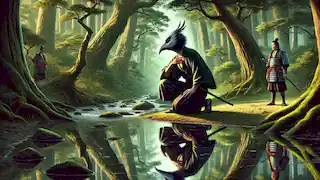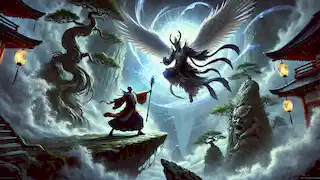In the misty mountains of Japan, there lies a legend as ancient as the trees that tower over the dense forests. It is the legend of the Tengu, a mythical creature that bridges the worlds of humans and spirits. Feared and revered, the Tengu are believed to be the protectors of the sacred and the punishers of those who wander from the path of righteousness. These beings, half-man and half-bird, have sparked fear, fascination, and respect throughout the centuries. This is their story, a tale of ambition, vengeance, and redemption. Long ago, during the Heian period, when the land was ruled by the emperor and the country was shrouded in superstition, the first Tengu was said to have been born. High in the mountains of Mount Kurama, a warrior named Kenjiro was in search of enlightenment. He was a fierce samurai, undefeated in battle, yet his heart was heavy with arrogance. His skill with the blade had brought him fame and fortune, but his ego had blinded him to the virtues of humility and respect for the spirits that roamed the land. One fateful night, as Kenjiro meditated deep in the heart of the forest, he was visited by a strange and powerful vision. A giant bird, with the face of a man, appeared before him, its eyes burning with wisdom and power. "You seek mastery over all," the bird-man said, "but you have yet to master yourself. Return to this place when you have conquered your pride, and perhaps then, you will truly know the way of the sword." Kenjiro, enraged by what he perceived as an insult, swore to defeat the mysterious being. He trained day and night, honing his skills, determined to prove himself superior. But as he descended further into his obsession, something strange began to happen. His reflection in the river no longer showed the man he once was. His face was becoming elongated, his nose sharper, and his eyes darker. It wasn’t long before the transformation became complete. Kenjiro had become the first Tengu. Over time, more men and women of arrogance and greed fell victim to the same fate as Kenjiro. These individuals, skilled in combat and driven by selfish desires, began to lose their humanity and transform into the Tengu. They became protectors of the forests, though their protection came at a cost. Anyone who dared challenge the sanctity of the sacred grounds or sought to misuse the power of the land would face the wrath of the Tengu. Their bird-like forms and sharp talons were terrifying, but it was their minds that posed the greatest threat. The Tengu were not merely mindless beasts. They were strategists, warriors, and spiritual guides. But as with Kenjiro, the curse of the Tengu came with the burden of immense pride. While some Tengu were content to guard their forests and pass judgment on travelers who wandered too far, others, consumed by their newfound power, sought to expand their influence beyond the mountains. This ambition led to conflict not only with humans but with the spiritual world as well. In the valleys below, villages began to fear the wrath of the Tengu. Stories of travelers who disappeared in the mountains, only to return years later as different men, spread like wildfire. Monks who sought to maintain the balance between the spiritual and mortal realms took it upon themselves to fight against these creatures. Clad in white robes and carrying prayer beads, they ventured into the forests in an attempt to banish the Tengu back to the shadows. However, the Tengu were not so easily defeated. One such monk, a man named Ryota, became the most famous of these exorcists. He was fearless, known for his spiritual power and his unwavering belief in the teachings of Buddha. Ryota set his sights on Mount Kurama, where he knew the Tengu gathered. With his sacred staff in hand, he ascended the mountain, prepared for a battle unlike any he had ever faced. Ryota’s journey up Mount Kurama was fraught with challenges. The deeper he went into the forest, the more he could feel the presence of the Tengu watching him. Every rustle of leaves, every snap of a twig sent chills down his spine. But Ryota was determined. He had been trained for this moment his entire life, and nothing would stop him from completing his mission. As Ryota reached the summit, he was greeted by a sight that would have sent any ordinary man fleeing in terror. The Tengu had gathered, their red faces twisted in a mix of curiosity and disdain. Kenjiro, the leader of the Tengu, stepped forward, his wings unfurled, casting a shadow over Ryota. "You come to banish us, monk?" Kenjiro sneered, his voice a low growl. "You, who claim to follow the path of enlightenment, yet seek to destroy what you do not understand." Ryota stood his ground, raising his staff in defiance. "You have lost your way, Kenjiro. You and your kind were once men, but now you are little more than demons. The people of this land suffer because of your pride." With that, the battle began. Kenjiro and the other Tengu launched themselves at Ryota with blinding speed, their talons sharp and their beaks gleaming in the dim light. But Ryota was prepared. He had spent years mastering his spiritual powers, and with each strike of his staff, he sent waves of energy rippling through the air, knocking the Tengu back. The battle raged for hours, neither side willing to give an inch. But as the sun began to set, Ryota knew that he could not keep this up forever. His energy was waning, and the Tengu were relentless. In a desperate move, Ryota called upon the power of the mountain itself, chanting an ancient prayer that had been passed down through generations of monks. The ground beneath his feet began to tremble, and the air around him crackled with energy. Kenjiro, sensing the power building within Ryota, let out a cry of rage and lunged at the monk. But it was too late. With a final, earth-shaking chant, Ryota unleashed a wave of pure spiritual energy that engulfed the Tengu, sending them flying into the sky. One by one, they were banished from the mortal realm, their screams echoing through the mountains. When the dust settled, Ryota stood alone on the summit, the wind howling through the trees. The Tengu were gone, but the cost of the battle had been great. Ryota collapsed to the ground, his body weak from the immense power he had wielded. He had won, but at what price? For many years after the battle, the mountains were peaceful. The villagers below no longer feared the wrath of the Tengu, and travelers once again dared to venture into the forests of Mount Kurama. Ryota had become a legend, his name spoken with reverence by those who sought to protect the balance between the mortal and spiritual worlds. But legends have a way of never truly fading. Deep within the heart of the mountain, where the Tengu had once roamed, a faint stirring could be felt. The spirits of the Tengu, though banished, had not been destroyed. Over time, their power began to grow once more, fed by the arrogance and ambition of men who sought to conquer the mountains. It was said that on certain nights, when the moon hung low in the sky and the wind whispered through the trees, the shadow of a Tengu could be seen soaring through the night. The people of the villages below began to whisper once more of the cursed spirits that haunted the mountains. Travelers who ventured too far into the forest began to disappear again, their fate unknown. The Tengu had returned, but this time they were more cautious. They no longer sought to dominate the world of men, but instead watched from the shadows, waiting for the moment when they might once again rise to reclaim their place as the guardians of the sacred forests. And so, the legend of the Tengu continues, a reminder of the dangers of pride and the power of the spirits that dwell in the hidden places of the world. The legend of the Tengu is one that has been passed down through generations in Japan. It is a tale that speaks to the dangers of arrogance and the importance of humility. The Tengu, once men, became something more – or perhaps something less – as a result of their desire for power and dominance. Yet, they also serve as protectors, albeit in a twisted form, of the sacred places in the world. The story of the Tengu reminds us that while power can corrupt, there is always the possibility of redemption, though it may come at a great cost.The Birth of a Legend

The Rise of the Tengu

The Battle for Kurama

The Return of the Tengu
Conclusion

The Legend of the Tengu
Reading Time: 8 min

About Story: The Legend of the Tengu is a Legend Stories from japan set in the Medieval Stories. This Dramatic Stories tale explores themes of Redemption Stories and is suitable for All Ages Stories. It offers Moral Stories insights. A tale of pride, power, and redemption in the misty mountains of Japan.

















